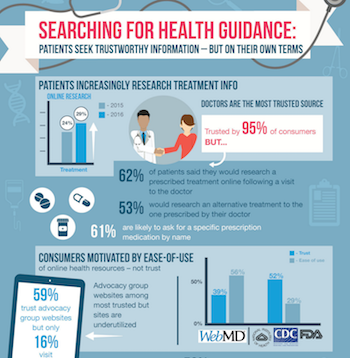 Consumers care more about ease of use than trustworthiness when it comes to looking up health information online, according to a Makovsky survey of 1,035 US adults that was fielded by market research firm Kelton.
Consumers care more about ease of use than trustworthiness when it comes to looking up health information online, according to a Makovsky survey of 1,035 US adults that was fielded by market research firm Kelton.
The survey revealed that although 59 percent of respondents said they trust health information that comes from advocacy group websites, just 16 percent said they use these websites to find health information online. This is because although advocacy groups are a trustworthy source, just 29 percent of consumers said they typically find their websites easy to use.
Other online health resources that were rated high on a trust scale by respondents were also ranked lower in terms of how much respondents said they used them. Some 53 percent of people said they trusted health information from health systems, but only 31 percent of people said they used health systems' websites as an online health source. Similarly, 51 percent of people said they trust the CDC, but just 21 percent of people said they used the CDC’s websites. This is likely because 41 percent of people said they thought health system websites are easy to use and just 27 percent think the CDC’s website is easy to use.
Meanwhile, only 39 percent of people said they trust WebMD, but 53 percent of people said they use WebMD, likely because an even higher number, 56 percent of people, said WebMD was easy to use.
"Online search is an essential part of consumer self-care and health education, but the way in which consumers leverage these resources continues to evolve," Makovsky Health SVP and Practice Director Tom Jones said in a statement. "In this year's survey, we saw significant shifts in consumer use of government agency health sites – calling out these sources as highly trustworthy, yet at the same time, few feel they are easy to use. Understanding this tug-of-war between trust and ease-of-use, in which ease-of-use ultimately wins, is incredibly important for health communicators and marketers seeking to reach consumers.”
Although 95 percent of consumers said doctors were the most trusted source for information, patients are using online sources to look up information before and after appointments. The type of information consumers are searching for before their appointment is changing. Makovsky found that the number of respondents that searched for treatment options before they went to their appointment increased by 21 percent year over year. And the number of people who searched for symptoms decreased by 14 percent.
After their doctor’s visit, 62 percent of consumers said they looked up information on a prescribed treatment online and 53 percent said they would search for alternative treatments than the one that was prescribed.


















